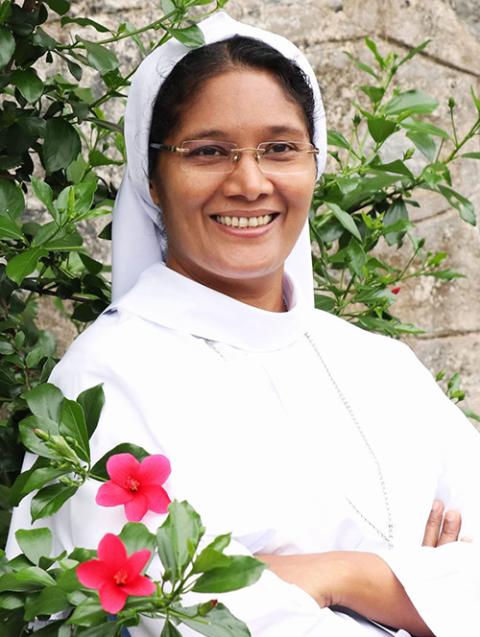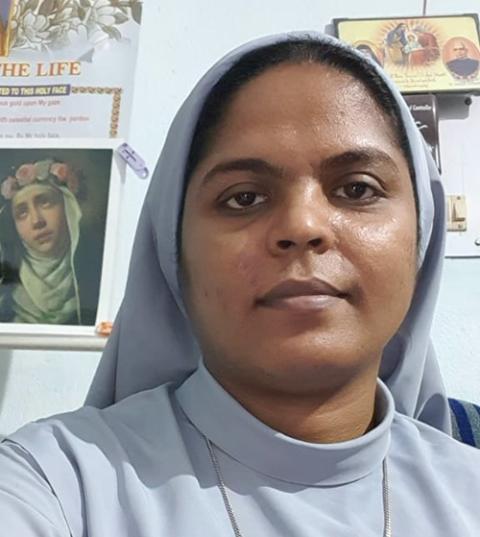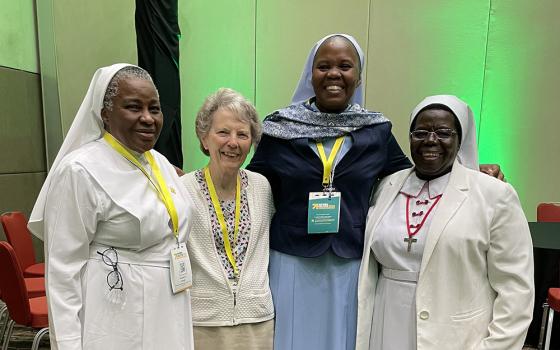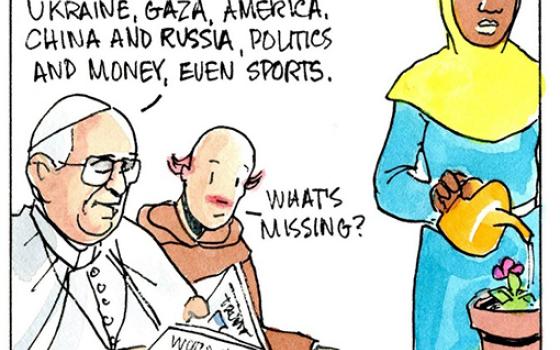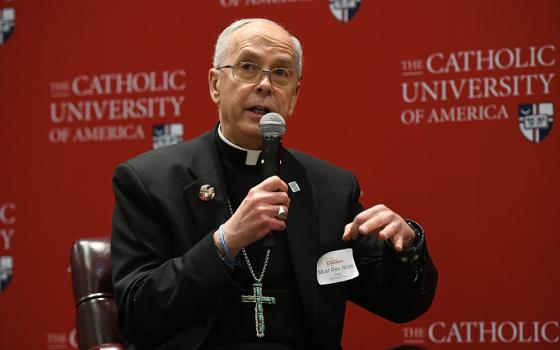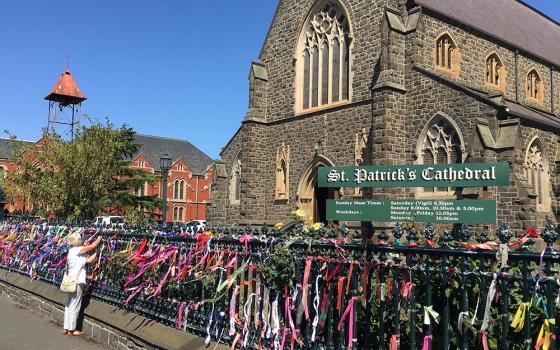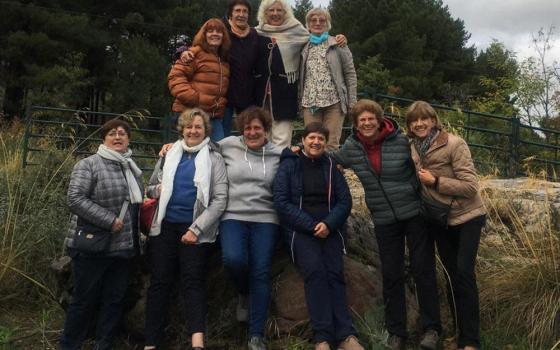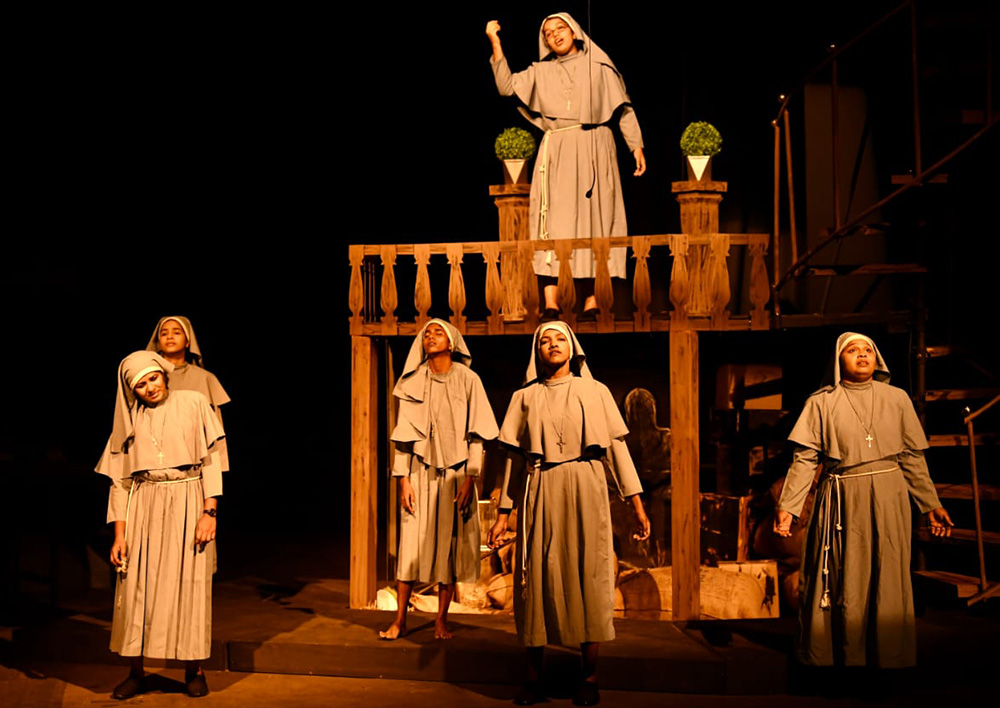
Actors play Catholic nuns in the controversial play "Kakkukali" at a theater in the southwestern Indian state of Kerala. The Catholic Church has demanded a ban on the play, saying it tarnishes the image of Catholic religious life. (Raneesh Raveendran)
Catholic nuns in the southwestern Indian state of Kerala continue to demand a ban on a controversial play two months after it was staged at an international theater festival. The play allegedly depicts them as lesbians and sexual partners of priests.
"It is so painful to see our religious life is being portrayed so nastily in a play creating suspicion about our life," bemoans Sr. Shirly Angelos, the secretary of the Kerala state unit of the Conference of Religious India, the national association of religious major superiors in the country.
The play — "Kakkukali" — in Malayalam, Kerala's local language, was staged Feb 5-14 at the International Theatre Festival of Kerala organized by the state government.
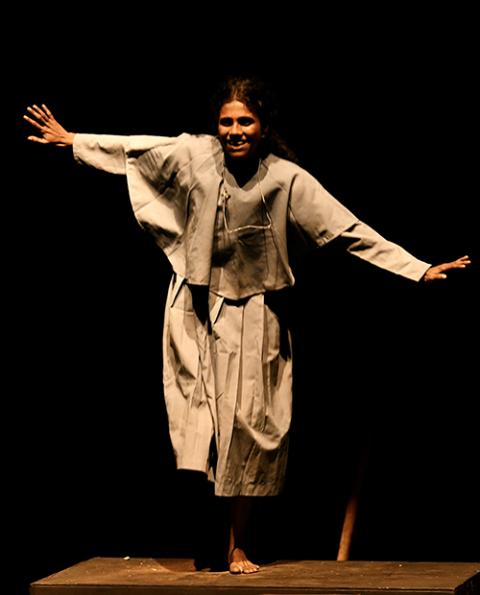
An actor playing a Catholic nun in the controversial Malayalam drama "Kakkukali" mimics a game played by girls in the southwestern Indian state of Kerala. (Raneesh Raveendran)
The play draws its title from a game played by girls in Kerala and portrays the ordeal of a young woman, daughter of a communist, after she joins a convent to become a nun, primarily to escape her family's abject poverty.
The play is the dramatization of a short story written by Francis Noronha, a Catholic, in 2018.
Angelos, a member of the Sister Handmaids of Charity of St. Vincent de Paul, says the nuns want the play banned "as it has tarnished the image of us so badly."
Kerala, a Christian stronghold in India, accounts for nearly one-third of the country's 103,000 religious women.
"I cannot imagine a life without my religious life. In fact, I cannot express my sorrow in words after seeing the horrible display of convent life in the play," Angelos told Global Sisters Report.
Cardinal Baselios Cleemis, president of the Kerala Catholic Bishops' Council, had also sought a ban on the staging of the play after an emergency meeting of bishops March 9. According to him, the play is likely to disturb the cultural fabric of Kerala's multireligious society.
According to census data, Christians form about 18.4% of Kerala's 34.6 million people. Hindus form about 54.7% and Muslims 26.6%, with less than .5% from other communities such as Sikhs and Jains.
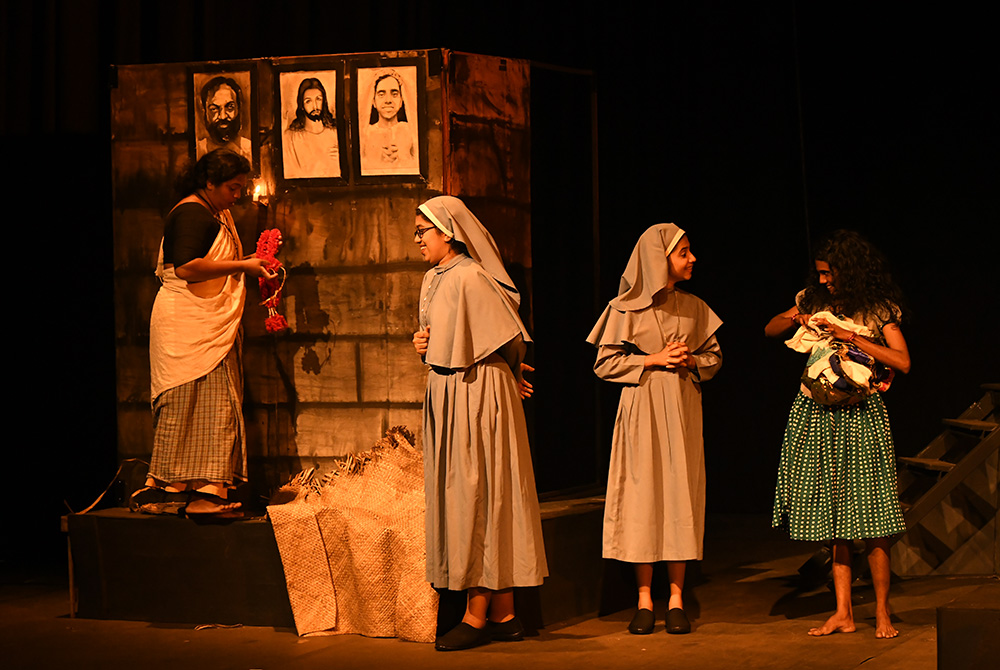
In a scene from the controversial play "Kakkukali," Catholic nuns visit the house of a communist to take his daughter to the convent after his death. The scene indicates that the girl does not want to join the convent, but her mother insists she go because of the family's poverty. (Raneesh Raveendran)
The state's coalition government, led by the Marxist party, has not responded to the bishops' appeal, irking the nuns and other Catholics. They have approached the head of Kerala's 14 civil districts to demand the ban in their respective areas.
"Our teams, including nuns, priests and laypeople have handed over memoranda to all the district collectors urging them to ban the staging of the drama that insults religious people, primarily nuns," Angelos added.
Sr. Vandana Daisy, a member of the Missionary Society of Mary Immaculate, says they will not "give up our fight until the government bans its staging."
According to her, the play is "a deliberate attempt to target and tarnish Catholic women religious, who do immense services for humanity."
K.B. Ajay Kumar, the playwright, denies the allegation, saying he has not made any attempt to target the church or tarnish its image.
"I cannot imagine disgracing nuns who selflessly serve physically challenged, old-age persons and abandoned children and others," the writer told Global Sisters Report, adding, "I read the Holy Bible many times before writing the script."
He also pointed out that the Kerala bishops' council had "even given an award to the short play," and wondered how the play became "so bad" suddenly.
Daisy, however, disputed the writer's claim, saying, "The drama is not the original version of the short story that only portrays the struggles of a poor daughter of a communist from a Dalit [formerly untouchable] background after joining the convent."
Noronha says his story does not have any reference to priests and it focuses only on the daughter of a communist joining the convent and her struggles to cope with the convent's discipline.
Noronha said he has not seen the entire show but only the 30-minute video of the play on the internet. "It definitely portrays a different picture as the director has taken the liberty to make necessary [changes] in a drama. This seems to have been misunderstood by the church people," he said.
Fr. Jacob Palakkappilly, the spokesperson of the Catholic bishops' council in Kerala, told GSR that the council had awarded Noronha for a book containing the collection of his writings. The short play on the nuns is a part of the book. So, the bishop did not award the author just for the play.
The girl joins the convent as her mother was unable to take care of her after her father's death.
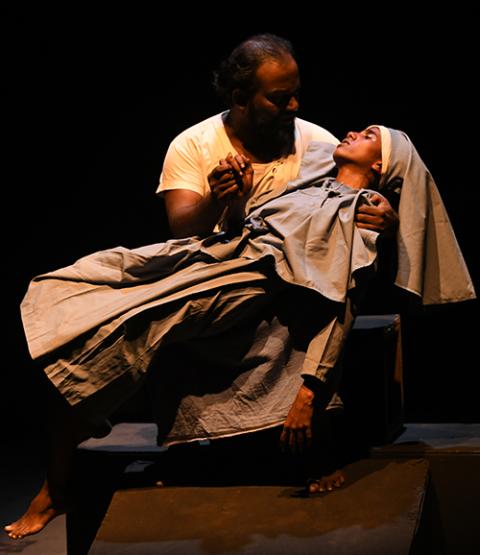
A scene from the controversial play "Kakkukali" (Raneesh Raveendran)
"The play, on the contrary, accused the church of taking advantage of the poverty to recruit girls to convents and deploy them for free work," Daisy asserted. "They then indulge in lesbianism or become sexual partners of priests. The play also alleges that nuns are subservient to priests who decide for the women religious. All this is a blatant lie."
Ajay Kumar, however, disagreed with Daisy, saying "The nuns, priests and other believers were misled by some vested interests with political backings to divide the Christian community."
He says those criticizing the 120-minute play have watched only a 30-minute video uploaded on the internet.
"The video is edited in such way that it has removed all positive aspects of the play and thus created confusion to everyone," lamented the writer.
He added, "We want everyone who criticizes us to watch the play once and their confusion will be over."
He also claimed that Catholics, including priests who had watched the play, had appreciated it and wanted it to be staged even in church circles. "The drama was staged in 14 places in the past two years and nobody questioned it."
The controversy emerged after it was chosen among four plays for the international event.
Sasi Kumar (no relation), the chief coordinator of the international event, has denied that the Kerala government had a role in selecting the controversial play for the festival.
Advertisement
"The drama was played at different places in the state even before we chose it to be played at the festival. Our focus was not on any controversial issues, but its art of fiction, which obviously had some relevance to the contemporary and past sociocultural issues," Sasi Kumar told GSR.
The play, Sasi Kumar said, does not aim to target Christianity or its religious people even though it makes some critical references based on the writer's creative idea. "Such things should not be misconstrued as criticism of Christian religion or its practices," the festival coordinator said.
In March, when the play was staged in Guruvayur, a major Hindu temple town in Kerala, some Catholics opposed it, saying it portrayed Christian religious life poorly and sought the ban.
The All India Youth Federation, a nationwide youth organization of the Communist Party of India, has opposed the church demand and supported the play. It asserted that the church demand "will only be considered as an intrusion to the freedom of expression." The federation vowed to organize more productions of the play across Kerala.
Holy Family Sr. Helen Tresa, a lawyer, points out that the play was staged mostly for Hindu audiences who are ignorant about the functioning of convents and the religious life of nuns and priests.
The play "has sent a very wrong message about us and our life in convents. Such acts of spreading misinformation about anyone are not protected under the right to freedom of expression," Tresa, a native of Kerala who now works in the eastern Indian state of Jharkhand, told GSR.
"No one has the right to denigrate the dignity of nuns or priests through such plays," she said.
Palakkappilly questioned the Kerala government's silence over what he says is the legitimate demand of the Christians.
"It shows the double standard of the government," he told GSR.
Maintaining that the play has "definitely lowered the image of the Catholic religious life," the church official appealed to the government to ban it.
"We will continue our peaceful protest against its staging until the government bans its staging," Palakkappilly asserted.
Kerala Catholic Congress, a lay group, in March filed a petition before the Kerala High Court, the top court in the state, seeking a ban on the play's staging. The court is yet to take it up for hearing.

